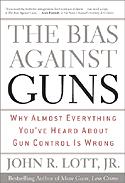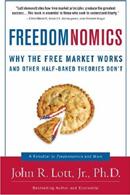Guns and Crime
by John R. Lott, Jr. by John R. Lott, Jr.
Philadelphia had 406 homicides in 2007, and, at 28 per 100,000 people, it also had the highest murder rate of any major city in the United States. No wonder Philadelphians want things done.
Recently, the city focused on a new tragedy, the murder of a 12-year police veteran and father of three, Sgt. Stephen Liczbinski, by three bank robbers with long, violent criminal records.
To Gov. Rendell, Mayor Nutter, Police Commissioner Charles Ramsey, and freshman U.S. Rep. Joe Sestak, the solution is simple: more gun control. After pushes failed for new state and local laws, last Thursday these four politicians announced that the solution to Philadelphia’s problems was re-enacting the Federal Assault Weapons Ban.
They focused on the Chinese SKS rifle used to shoot Liczbinski five times. Rendell claims that "the only people who should have weapons like this is the police and the military." Some are calling the SKS an "assault weapon," although it is not so defined in any federal law and is not banned as such. And although the phrase assault weapon conjures up images of the rapid-fire machine guns used by the military, the SKS rifle is not a machine gun, instead functioning the same way as any semiautomatic hunting rifle. It fires a bullet similar to (indeed, slightly less powerful than) those fired from deer-hunting rifles, with the exact same rapidity.
This debate might make more sense if there were some evidence that the Federal Assault Weapons Ban lowered crime rates, but all the published academic studies by criminologists and economists find that neither the initial ban in 1994 nor its sun-setting in 2004 changed rates of murder or other violent crimes. Similarly, there is no evidence that state bans have mattered.
For example, a report for the National Institute of Justice by Christopher Koper, Daniel Woods and Jeffrey Roth at the University of Pennsylvania’s Jerry Lee Center of Criminology studied the first nine years of the federal ban and found that "we cannot clearly credit the ban with any of the nation’s recent drop in gun violence. And, indeed, there has been no discernible reduction in the lethality and injuriousness of gun violence." They note that "the gun-ban provision targets a relatively small number of weapons based on outward features or accessories that have little to do with the weapons’ operation."
Even gun control groups realize that the presence or absence of such laws make little difference. Before the federal law sunset, a representative for the Violence Policy Center, a gun control group, said that "if the existing assault-weapons ban expires, I personally do not believe it will make one whit of difference one way or another in terms of our objective, which is reducing death and injury and getting a particularly lethal class of firearms off the streets." The center argued that the law involved only "minor changes in appearance."
 Indeed, the U.S. murder rate was 5.7 per 100,000 people in 2003, the last full year before the law sunset. It was still 5.7 in 2006. Over the same period, the rate of violent crimes fell slightly. In the 43 states without their own assault-weapons bans, the murder rates fell, while they rose in the seven states with such bans. Violent-crime rates fell more quickly in the 43 without bans than in the seven states with them.
Indeed, the U.S. murder rate was 5.7 per 100,000 people in 2003, the last full year before the law sunset. It was still 5.7 in 2006. Over the same period, the rate of violent crimes fell slightly. In the 43 states without their own assault-weapons bans, the murder rates fell, while they rose in the seven states with such bans. Violent-crime rates fell more quickly in the 43 without bans than in the seven states with them.
Yet it always seems easier for politicians to blame the lack of gun control rather than focusing on their own responsibilities. When Washington and Chicago experienced explosions in murder and violent crime after banning handguns, leaders there did not blame their bans, but rather they blamed the rest of the country that had not also adopted stricter regulations.
 Ultimately, however, is it really surprising that Philadelphia’s murder rates have risen while its arrest rates have fallen?
Ultimately, however, is it really surprising that Philadelphia’s murder rates have risen while its arrest rates have fallen?
Former state House Speaker John Perzel proposed a different approach (an approach Rendell opposes) to fix Philadelphia’s low and falling arrest rates. Perzel’s solution? Help Philadelphia hire more police.
 If politicians are unwilling to spend more money on police or to make the police force work more effectively, there is another solution: Encourage law-abiding citizens to defend themselves. One possibility is to eliminate fees for poor law-abiding people, those who are the most vulnerable victims of crime, to obtain concealed-handgun permits. If the government isn’t going to protect people, why charge them for the opportunity to defend themselves? Research by David Mustard at the University of Georgia also found that more concealed-handgun permits reduce the number of criminals with guns and thus reduce violence against police officers.
If politicians are unwilling to spend more money on police or to make the police force work more effectively, there is another solution: Encourage law-abiding citizens to defend themselves. One possibility is to eliminate fees for poor law-abiding people, those who are the most vulnerable victims of crime, to obtain concealed-handgun permits. If the government isn’t going to protect people, why charge them for the opportunity to defend themselves? Research by David Mustard at the University of Georgia also found that more concealed-handgun permits reduce the number of criminals with guns and thus reduce violence against police officers.
Obsessing on gun control proposals distracts from doing what works. At some point it should be obvious to everyone, even politicians, that all the hype about "assault weapons" is just wrong.




